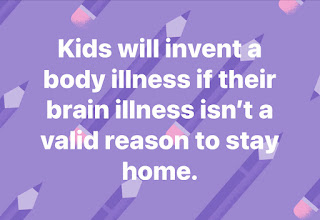"They HAVE TO Go to School, Right?"
One of my greatest frustrations in family therapy is the pressure of sending kids to school.
Don’t get me wrong, I think education is awesome. But it shouldn’t be used as a bludgeon to our mental health… which we need to become educated.
How does this happen? One reason is–ironically–the lack of education. If a kid is having an urge to not go to school, there is a REAL reason for it (one that isn’t a character flaw). Most of the time, there are serious issues going on outside of academics, such as marital conflict, bullying, friend tension, feeling misunderstood, etc. When these stressors build up, they will first make us anxious: we enter Fight/Flight brain, where logic and learning capacity decrease, and we enter “survival mode” when we do just enough to get by with the bare minimum. This is a hard state to go to school in, but it’s manageable.
*And, even if it is just about not feeling prepared for a test, seeing a crush, or avoiding friend drama, there are VALID emotions behind these that must be processed, not stuffed and invalidated.
When the stressors become overwhelming, the brain system gets flooded and we enter Freeze, where we lose almost all cognitive and emotional function, and become unmotivated lifeless bodies that can pretty much just breathe and maintain a pulse. You’ve seen these kids in class. They might be able to pass with D minuses by coming to school and vegging out in the back of the room, but they definitely aren’t learning anything.
Many parents think, “Well, it would be better just to push through til they graduate, right?”. I can’t make calls for all situations, but I’m just not seeing this method work out long-term. A high school diploma means nothing if it involved little or no learning, a frayed relationship with parents, and abysmal mental health for a teen who now has trouble launching because the problems are still there. Graduating with Ds doesn’t set kids up to get better–it’s just a band aid for parents’ anxiety.
So what does this mean? Again, I think kids should go to school, but think they should go to school with all the necessary tools, including the part of the brain that can actually learn. This means that, if kids say or act like they don’t want to go, we don’t force them to get bludgeoned by logic and learning when it won’t do any good. This just makes it worse.
What we CAN do is have boundaries in place to make sure a “mental health day” has its intended effects. Staying home is an indicator of poor health, which means we need to create a healing environment. People recover best from emotional distress without distractions, like social media, video games, tv, etc. This allows us to spend time with our thoughts and feelings and work through them, rather than avoid them. Being out in nature helps. Having others around to help you work through emotions without judging fixing, lecturing, persuading, or arguing makes all the difference. If you are made to feel like a bad person for feeling mentally ill, and thus unproductive, it is MUCH harder to recover.
This is actually the hardest part for parents. Once I teach them the brain science, they usually agree, but their own emotions keep them freaking out about their kids taking time off to treat emotions. They continue to nag, shame, and push, and suggest, WITHOUT setting the recommended boundaries. They then complain that my suggestions aren’t working. When I take time to explore this anxiety, I often find experiences where these parents never felt allowed to have emotions, or pain, or illness. They stuffed them hard and stayed productive, and now have a phobia of other people not doing the same (an often overlooked anxiety symptom), as well as other symptoms of suppressed emotion (see "Covert Depression"). They must often process their own trauma before I can expect them to help their child.
But, when kids are allowed to work through their emotions without getting the message that they are bad, lazy, or irresponsible for going through a natural healing process; or, that getting a GED, graduating late, or seeking a vocational calling will usher in the apocalypse; they are likely to be mentally healthy, and thus MORE LIKELY to feel motivated to learn.
See posts:
-Depression, The Natural Process
-How We Keep Injuries from Healing
-Steps Booklet, section on Boundaries
-The Brain and The Bucket (for the many reasons we become flooded)


Comments
Post a Comment